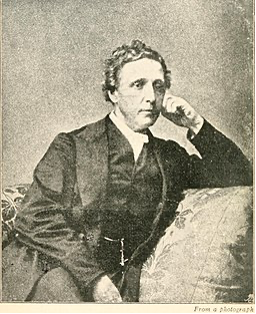by Angelika Zirker
On Thursday, December 23, 1897, Lewis Carroll (who was called Charles Lutwidge Dodgson in his professional life as a lecturer at Christ Church College in Oxford) wrote in his diary:
I start for Guildford by the 2.07 today.
It would be his last journey from Oxford to Guildford where he spent Christmas, “as was his custom” (Diaries 9: 355n567), with his sisters.
A few days into the New Year, on January 5, 1898, he learned by telegram of the unexpected death of his brother-in-law, Charles Collingwood: “His sister, Mary, begged him to come to Southwick [Sunderland] to provide help and comfort for the family.
He wrote back on the same day sending his sincere sympathy and indicating: ‘I would certainly have come to you, if I could have done so with reasonable prudence: but, with a feverish cold, of the bronchial type, and the risk of ague (a form my colds usually take), Dr. Gabb forbids me to risk it.’ He also wrote to his nephew, Stuart Collingwood, giving advice about the funeral arrangements.” (Diaries 9: 355n567).

Lewis Carroll in Later Life; https://en.wikipedia.org/wiki/Lewis_Carroll
His health deteriorated rapidly from this point on, with the fever rising; Dodgson continued to document his health condition until a few days later. In the early afternoon of January 14, “he passed,” as his nephew noted in The Life and Letters of Lewis Carroll that he published later that year, “from a world of incompleteness and disappointment, to another where God is putting his beautiful soul to nobler and grander work that was possible for him here, where he is learning to comprehend those difficulties which used to puzzle him so much, and where that infinite Love, which he mirrored so wonderfully in his own life, is being revealed to him ‘face to face’.” (Collingwood, qtd. in Diaries 9: 356n567).
The funeral was simple and took pace on January 19, 1898; while it had only few attendants, including the Dean of Christ Church, Francis Paget, the mourning for the author of the Alice-books was international and lasting. A memorial service was held at Christ Church Cathedral on January 23, 1898. The Dean, Francis Paget, held a sermon on “The Virtue of Simplicity” and said: “And though the work that bore the fame of Lewis Carroll far and wide stands in distant contrast with the Dean’s [the former Dean Liddell, the father of Alice, had passed away on January 18], still it has no rival in its own wonderful and happy sphere; and in a world where many of us laugh too seldom, and many of us laugh amiss, we all owe much to one whose brilliant and incalculable humour found us fresh springs of clear and wholesome and unfailing laughter.” (Diaries 9: 357n567).
It was this laughter that Lewis Carroll associated with the time of childhood that, to him, was a period of longing and that he referred to in first framing poem of Through the Looking-Glass and What Alice Found There (first published in December 1871 – see our November 2021 Literary Anniversary):
Child of the pure unclouded brow
And dreaming eyes of wonder!
Though time be fleet, and I and thou
Are half a life asunder,
Thy loving smile will surely hail
The love-gift of a fairy-tale.
I have not seen thy sunny face,
Nor heard thy silver laughter;
No thought of me shall find a place
In thy young life’s hereafter –
Enough that now thou wilt not fail
To listen to my fairy-tale.
A tale begun in other days,
When summer suns were glowing –
A simple chime, that served to time
The rhythm of our rowing –
Whose echoes live in memory yet,
Though envious years would say ‘forget’.
Come, hearken then, ere voice of dread,
With bitter tidings laden,
Shall summon to unwelcome bed
A melancholy maiden!
We are but older children, dear,
Who fret to find our bedtime near.
Without, the frost, the blinding snow,
The storm-wind’s moody madness –
Within, the firelight’s ruddy glow,
And childhood’s nest of gladness.
The magic words shall hold thee fast:
Thou shalt not heed the raving blast.
And though the shadow of a sigh
May tremble through the story,
For ‘happy summer days’ gone by,
And vanish’d summer glory –
It shall not touch with breath of bale
The pleasance of our fairy-tale.
(Carroll, The Annotated Alice 139)
Lewis Carroll’s life ended suddenly after his short illness, in winter. Read in this light, the winter in his poem becomes metaphorical: he not only refers to the season of the year but also to human life, especially in contrast to the summer of youth. While there is winter outside, with cold, snow and wind, the warmth inside is linked to “childhood’s nest of gladness” (which is a contrast to “madness”). The outer age is juxtaposed with the inner age, and in the latter childhood can be maintained: the magic words safeguard childishness and protect from the cold. The poem expresses the regret for time passing but, simultaneously, also emphasizes that, with the help of the narrative, the times past will not be forgotten (see Zirker 17): “It [the shadow of a sigh] shall not touch, with breath of bale, / The pleasance of our fairy tale.” The inner world of all readers will remain unchanged through the narrative and thus will the pleasure of being a child. And so we continue to read Lewis Carroll’s Alice-books, 125 after his death – and beyond.
For Lewis Carroll’s grave, see here: https://commons.wikimedia.org/wiki/File:Life_and_Letters_of_Lewis_Carroll_-_Lewis_Carroll%27s_Grave.jpg
For the memorial plaque for Lewis Carroll in Westminster Abbey, see here: https://www.westminster-abbey.org/de/abbey-commemorations/commemorations/lewis-carroll
Works Cited
Carroll, Lewis. The Annotated Alice. Ed. Martin Gardner. London: Penguin, 2001.
Carroll, Lewis. Lewis Carroll’s Diaries. 10 vols. Luton: The Lewis Carroll Society, 1993-2007.
Collingwood, Stuart. The Life and Letters of Lewis Carroll. London: T. Fisher Unwin, 1899 [1898]. https://www.gutenberg.org/files/11483/11483-h/11483-h.htm
Zirker, Angelika. Der Pilger als Kind: Spiel, Sprache und Erlösung in Lewis Carrolls Alice-Büchern. Religion und Literature / Religion and Literature. Münster: LIT, 2010.